
The Finnish Defence Forces (FDF) (Finnish: Puolustusvoimat, Swedish: Försvarsmakten) are the military of Finland. The Finnish Defence Forces consist of the Finnish Army, the Finnish Navy, and the Finnish Air Force. In wartime, the Finnish Border Guard becomes part of the Finnish Defence Forces.
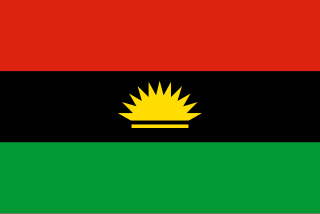
Biafra, officially the Republic of Biafra, was a partially recognised state in West Africa that declared independence from Nigeria and existed from 1967 until 1970. Its territory consisted of the former Eastern Region of Nigeria, predominantly inhabited by the Igbo ethnic group. Biafra was established on 30 May 1967 by Igbo military officer and Eastern Region governor C. Odumegwu Ojukwu under his presidency, following a series of ethnic tensions and military coups after Nigerian independence in 1960 that culminated in the 1966 anti-Igbo pogrom. The Nigerian military proceeded to attempt to reclaim the territory of Biafra, resulting in the start of the Nigerian Civil War. Biafra was formally recognised by Gabon, Haiti, Ivory Coast, Tanzania, and Zambia while receiving de facto recognition and covert military support from France, Portugal, Israel, South Africa and Rhodesia. After nearly three years of war, during which around two million Biafran civilians died, President Ojukwu fled to Ivory Coast in exile as the Nigerian military was approaching the capital of Biafra. Philip Effiong became the second president of Biafra, and he oversaw the surrender of Biafran forces to Nigeria.

The 101st Airborne Division (Air Assault) ("Screaming Eagles") is a light infantry division of the United States Army that specializes in air assault operations. It can plan, coordinate, and execute multiple battalion-size air assault operations to seize terrain. These operations can be conducted by mobile teams covering large distances, fighting behind enemy lines, and working in austere environments with limited or degraded infrastructure. It was active in, for example, foreign internal defense and counterterrorism operations in Iraq, in Afghanistan in 2015–2016, and in Syria, as part of Operation Inherent Resolve in 2018–2021.
Spetsnaz, are special forces in many post-Soviet states. Historically, this term referred to the Soviet Union's Spetsnaz GRU, special operations units of the GRU, the main military intelligence service. Today it refers to special forces branches and task forces subordinate to ministries including defence, internal affairs, or emergency situations in countries that have inherited their special purpose units from the now-defunct Soviet security agencies.

The People's Liberation Army Air Force, also referred to as the Chinese Air Force (中国空军) or the People's Air Force (人民空军), is an aerial service branch of the People's Liberation Army, the military force of the People's Republic of China. The PLAAF was officially established on 11 November 1949 and it is composed of five branches: aviation, ground-based air defense, radar, Airborne Corps and other support elements.

The Nigerian Civil War, also known as the Biafran War, was a civil war fought between Nigeria and the Republic of Biafra, a secessionist state which had declared its independence from Nigeria in 1967. Nigeria was led by General Yakubu Gowon, while Biafra was led by Lieutenant Colonel Chukwuemeka "Emeka" Odumegwu Ojukwu. Biafra represented the nationalist aspirations of the Igbo ethnic group, whose leadership felt they could no longer coexist with the federal government dominated by the interests of the Muslim Hausa-Fulanis of Northern Nigeria. The conflict resulted from political, economic, ethnic, cultural and religious tensions which preceded the United Kingdom's formal decolonisation of Nigeria from 1960 to 1963. Immediate causes of the war in 1966 included a military coup, a counter-coup, and anti-Igbo pogroms in Northern Nigeria.
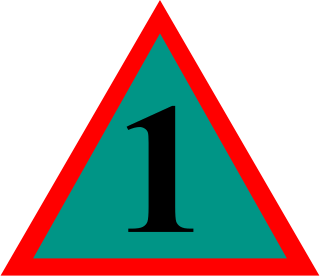
The 1st Armoured Infantry Brigade was an infantry brigade of the British Army with a long history including service during both the First and the Second World Wars. It was based at Tidworth Camp. Previously, it has been designated 1st (Guards) Brigade, 1st Infantry Brigade, 1st Mechanised Brigade, and under the initial Army 2020 reforms assumed the title of 1st Armoured Infantry Brigade. Under the Future Soldier programme, the brigade merged with the 1st Artillery Brigade to form the 1st Deep Recce Strike Brigade Combat Team.
Expeditionary warfare is a military invasion of a foreign territory, especially away from established bases. Expeditionary forces were in part the antecedent of the modern concept of rapid deployment forces. Traditionally, expeditionary forces were essentially self-sustaining with an organic logistics capability and with a full array of supporting arms.

The 2nd Guards Tank Army was a large military formation of the Red Army and later the Soviet Army, now part of the Russian Ground Forces of the Russian Federation.
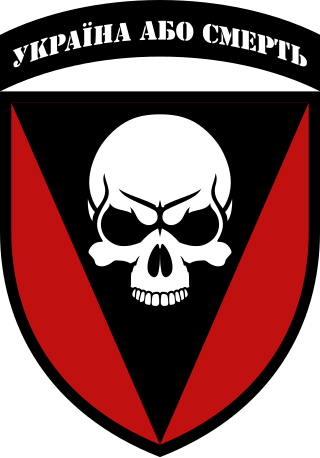
The 72nd Mechanized Brigade named after theBlack Zaporozhians is a formation of the Ukrainian Ground Forces. It was previously named the 29th Rifle Division and then the 72nd Guards Rifle Division of the Soviet Ground Forces. In 1957, it became a motor rifle division.

The 93rd Separate Mechanized Brigade "Kholodnyi Yar" is a formation of the Ukrainian Ground Forces formed in 1992. It has been described as "one of the most brutally effective" of Ukraine’s front-line brigades.

The 51st Army was a field army of the Red Army that saw action against the Germans in World War II on both the southern and northern sectors of the front. The army participated in the Battle of the Kerch Peninsula between December 1941 and January 1942; it was destroyed in May 1942 with other Soviet forces when the Wehrmacht launched an operation to dislodge them from the peninsula. The army fought in the Battle of Stalingrad during the winter of 1942–43, helping to defeat German relief attempts. From late 1944 to the end of the war, the army fought in the final cutting-off of German forces in the Courland area next to the Baltic. Inactivated in 1945, the army was activated again in 1977 to secure Sakhalin and the Kuril Islands. Following the dissolution of the Soviet Union, the army continued in existence as a component of the Russian Ground Forces. The army was active during two periods from 1941 until 1997.

The Counter Terrorism Service is a special operations force of Iraq. The Agency was founded in 2007, but originally was created in 1950, but was disbanded and recruited from scratch by the United States federal government after the 2003 U.S. invasion. It was originally known as the Iraqi Special Operations Forces (ISOF). The forces, directed by the Iraqi Counter Terrorism Service, consist of the Iraqi Counter Terrorism Command, which has three brigades subordinate to it. The Counter Terrorism Service is funded by the Iraqi Ministry of Defence.
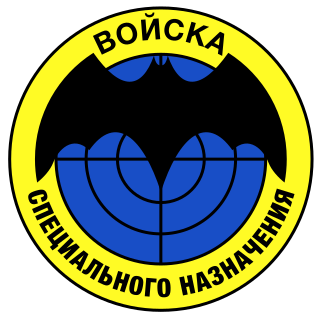
Spetsnaz GRU, formally known as Special Forces of the Main Directorate of the General Staff of the Russian Armed Forces, is the special forces (spetsnaz) of the GRU, the foreign military intelligence agency of the Armed Forces of the Russian Federation.

Rolf Steiner is a German retired mercenary. He began his military career as a French Foreign Legion paratrooper and saw combat in Vietnam, Egypt, and Algeria. Steiner rose to the rank of lieutenant colonel commanding the 4th Commando Brigade in the Biafran Army during the Nigerian Civil War, and later fought with the Anyanya rebels in southern Sudan.

The fall of Enugu was a military conflict between Nigerian and Biafran forces in September and October 1967 during the Nigerian Civil War which centered around Enugu, the capital of the secessionist Republic of Biafra. Nigerian federal forces had made Enugu's capture a priority shortly after war broke out, but their advance stalled at Nsukka. Biafran president and leader Odumegwu Ojukwu, attempted to distract the Nigerian Army by initiating an invasion of Nigeria's Mid-Western Region in August, but the offensive was brought to a halt. Lieutenant Colonel Theophilus Danjuma took charge of the Nigerian forces at the Nsukka front and prepared to advance on Enugu with seven battalions of the 1st Division. Enugu was garrisoned by one brigade led by Colonel Alexander Madiebo and poorly armed civilians called into service. Danjuma decided to launch an offensive with his forces spread over a broad front to make it more difficult for the Biafrans to block them along major roads as had happened up to that point.

Operation Inherent Resolve (OIR) is the United States military's operational name for the international war against the Islamic State (IS), including both a campaign in Iraq and a campaign in Syria, with a closely related campaign in Libya. Through 18 September 2018, the U.S. Army's III Armored Corps was responsible for Combined Joint Task Force – Operation Inherent Resolve (CJTF—OIR) and were replaced by the XVIII Airborne Corps. The campaign is primarily waged by American and British forces in support of local allies, most prominently the Iraqi security forces and Syrian Democratic Forces (SDF). Combat ground troops, mostly special forces, infantry, and artillery have also been deployed, especially in Iraq. Of the airstrikes, 70% have been conducted by the military of the United States, 20% by the United Kingdom and the remaining 10% being carried out by France, Turkey, Canada, the Netherlands, Denmark, Belgium, Saudi Arabia, the United Arab Emirates, Australia and Jordan.

The Biafran Armed Forces (BAF) were the military of the Republic of Biafra, which existed from 1967 until 1970.
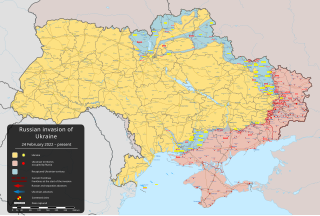
The following outline is provided as an overview of and topical guide to the Russo-Ukrainian War:
The Babies of Biafra was a Biafran aviation unit. Foreign mercenaries and Igbo served in the squadron.















